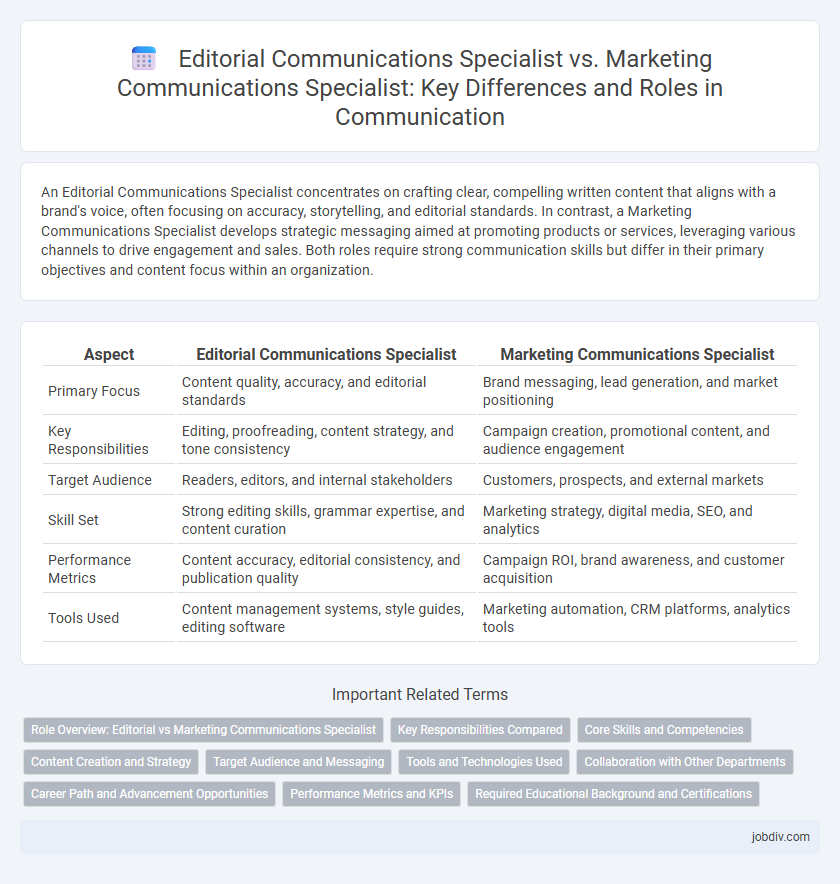An Editorial Communications Specialist concentrates on crafting clear, compelling written content that aligns with a brand's voice, often focusing on accuracy, storytelling, and editorial standards. In contrast, a Marketing Communications Specialist develops strategic messaging aimed at promoting products or services, leveraging various channels to drive engagement and sales. Both roles require strong communication skills but differ in their primary objectives and content focus within an organization.
Table of Comparison
| Aspect | Editorial Communications Specialist | Marketing Communications Specialist |
|---|---|---|
| Primary Focus | Content quality, accuracy, and editorial standards | Brand messaging, lead generation, and market positioning |
| Key Responsibilities | Editing, proofreading, content strategy, and tone consistency | Campaign creation, promotional content, and audience engagement |
| Target Audience | Readers, editors, and internal stakeholders | Customers, prospects, and external markets |
| Skill Set | Strong editing skills, grammar expertise, and content curation | Marketing strategy, digital media, SEO, and analytics |
| Performance Metrics | Content accuracy, editorial consistency, and publication quality | Campaign ROI, brand awareness, and customer acquisition |
| Tools Used | Content management systems, style guides, editing software | Marketing automation, CRM platforms, analytics tools |
Role Overview: Editorial vs Marketing Communications Specialist
An Editorial Communications Specialist primarily focuses on creating, editing, and curating written content to ensure clarity, consistency, and alignment with brand voice across publications, internal documents, and media materials. In contrast, a Marketing Communications Specialist develops and implements strategic campaigns aimed at promoting products or services, utilizing diverse channels such as social media, email marketing, and advertising to drive customer engagement and sales. Both roles require strong writing skills, but the Editorial Specialist emphasizes content quality and accuracy, while the Marketing Specialist centers on audience targeting and conversion metrics.
Key Responsibilities Compared
Editorial Communications Specialists focus on crafting, editing, and refining internal and external content to ensure clarity, consistency, and alignment with brand voice. Marketing Communications Specialists develop strategic messaging, manage campaigns, and coordinate promotional efforts to drive brand awareness and customer engagement. Both roles require strong writing and storytelling skills but differ in their emphasis on content creation versus campaign execution.
Core Skills and Competencies
Editorial Communications Specialists excel in content creation, editorial judgment, and storytelling with strong command over language, grammar, and style guidelines. Marketing Communications Specialists focus on brand messaging, campaign strategy, market research, and audience segmentation to drive engagement and conversions. Both roles require proficiency in digital tools, project management, and stakeholder collaboration, but Editorial Specialists prioritize content accuracy while Marketing Specialists emphasize promotional impact.
Content Creation and Strategy
Editorial Communications Specialists excel in content creation by producing clear, accurate, and engaging editorial materials tailored for internal or external audiences, emphasizing brand voice consistency and storytelling. Marketing Communications Specialists focus on strategic content development aligned with marketing goals, crafting promotional messages and campaigns designed to drive engagement, lead generation, and brand awareness. Both roles require strong writing and strategic skills, but Editorial Specialists prioritize editorial standards and content accuracy, while Marketing Specialists concentrate on market-driven content strategy and persuasive communication.
Target Audience and Messaging
Editorial Communications Specialists craft precise, informative content aimed primarily at internal stakeholders, industry experts, and niche audiences, focusing on clarity and subject matter accuracy. Marketing Communications Specialists develop persuasive, brand-aligned messaging targeting broader consumer segments to drive engagement, brand awareness, and sales conversions. Each role tailors communication strategies based on audience demographics and intent, ensuring messaging resonates effectively within specific market or organizational contexts.
Tools and Technologies Used
Editorial Communications Specialists primarily utilize content management systems (CMS) like WordPress and editorial workflow software such as Trello or Asana to streamline article production and collaboration. Marketing Communications Specialists rely heavily on marketing automation platforms like HubSpot, email marketing tools such as Mailchimp, and analytics tools including Google Analytics to design, execute, and measure targeted campaigns. Both roles incorporate social media management tools like Hootsuite or Buffer but focus on different content types and audience engagement strategies.
Collaboration with Other Departments
An Editorial Communications Specialist collaborates closely with editorial teams, writers, and content creators to ensure consistent messaging and brand voice across publications and media. A Marketing Communications Specialist works alongside sales, product development, and digital marketing departments to design campaigns that drive customer engagement and conversion. Both roles require seamless interdepartmental coordination to align strategic objectives and maintain unified external communications.
Career Path and Advancement Opportunities
Editorial Communications Specialists often advance by specializing in content strategy, editorial management, or publishing roles, leveraging strong writing and storytelling skills to influence brand narratives. Career paths typically lead to senior editorial positions, content director roles, or editorial consultancy with a focus on enhancing internal and external communications. Marketing Communications Specialists progress towards roles like marketing manager, brand strategist, or communications director, capitalizing on expertise in campaign development, market analysis, and integrated marketing strategies to drive business growth.
Performance Metrics and KPIs
Editorial Communications Specialists prioritize performance metrics such as content engagement rates, reader retention, and editorial calendar adherence to optimize message clarity and audience connection. Marketing Communications Specialists focus on KPIs including conversion rates, lead generation, return on marketing investment (ROMI), and brand awareness metrics to drive sales and market growth. Both roles leverage data analytics but target distinct outcomes aligned with editorial quality versus market-driven objectives.
Required Educational Background and Certifications
An Editorial Communications Specialist typically requires a bachelor's degree in journalism, communications, or English, with certifications such as Certified Professional Editor (CPE) enhancing credibility. A Marketing Communications Specialist often holds a degree in marketing, business, or communications, with certifications like the American Marketing Association's Professional Certified Marketer (PCM) proving beneficial. Both roles emphasize strong writing and communication skills, but their educational paths and certifications are tailored to their specific industry focus.
Editorial Communications Specialist vs Marketing Communications Specialist Infographic

 jobdiv.com
jobdiv.com